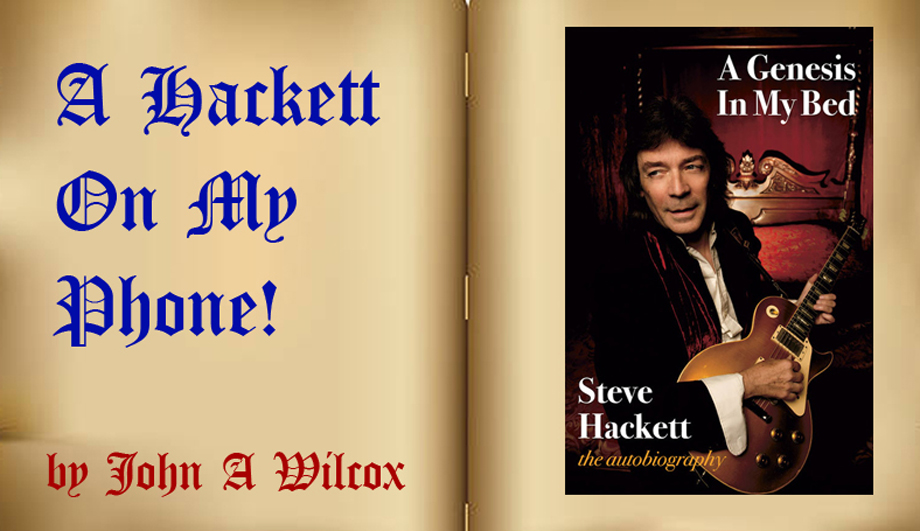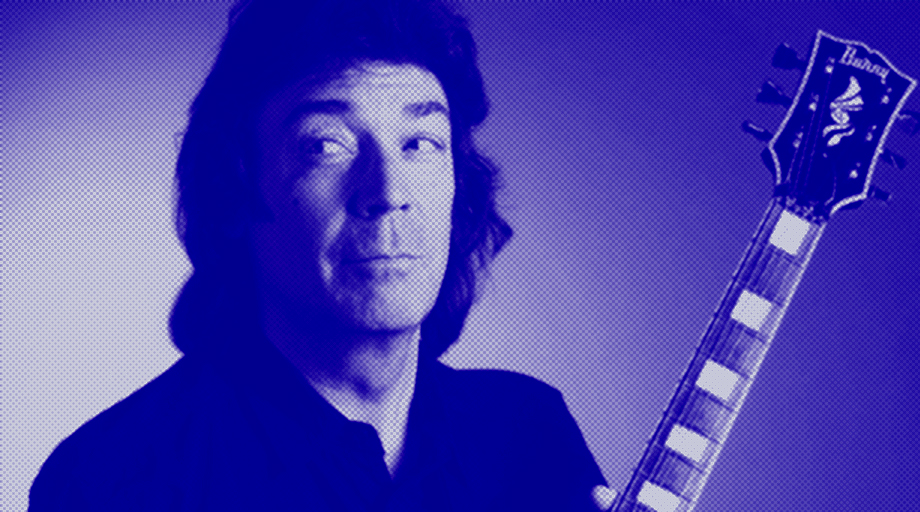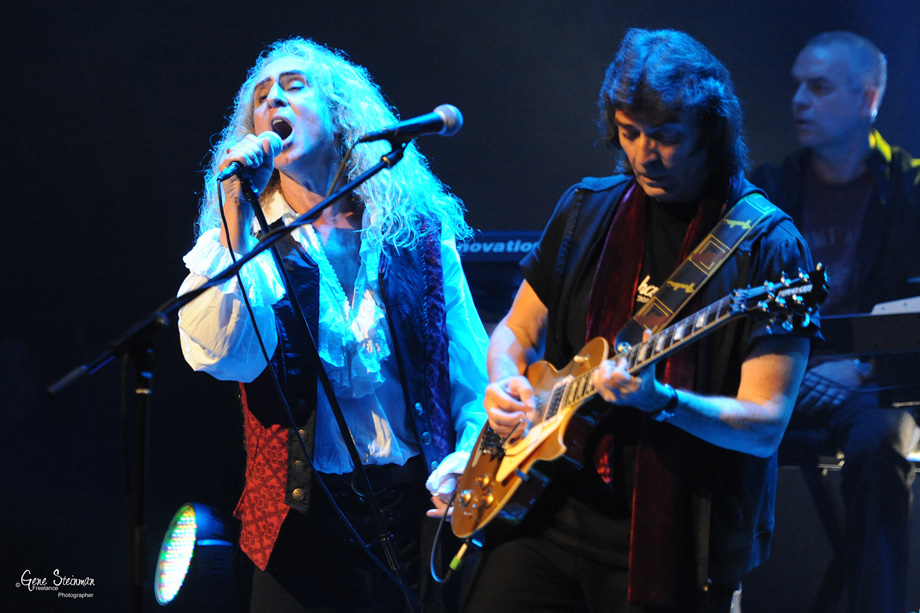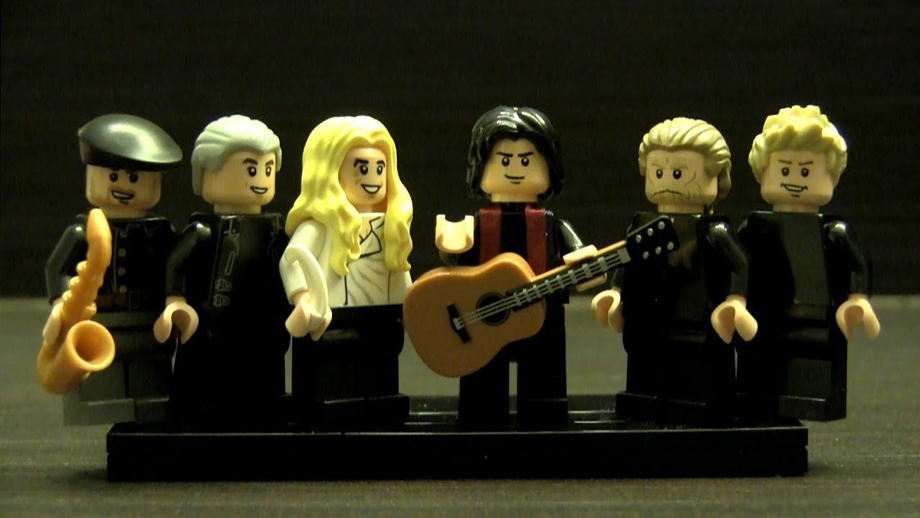A Hackett On My Phone!

by John A. Wilcox
Steve Hackett is a tremendously busy lad, even during Covid times! Not only does he have a fine new live set out - Selling England By The Pound & Spectral Mornings Live At Hammersmith, but he has also released his autobiography titled A Genesis In My Bed. The book is an engaging, unfiltered look at Hackett's life from boyhood to Covid and all points in between. It's packed with fascinating stories - none of which will be revealed here! Buy the book! Hackett & I chatted one afternoon about the book and so much more. Do join us...

PS: We've got to stop meeting like this! How is your day going?
SH: Very good, I've had a day recording and it's been fun. It's 8:00 at night here now, so yeah, it's been going very well indeed.
PS: One of the things I love so much about the book is there's so many wonderful stories in it. and I don't want to give away a single one to the readers because one of the great joys was a surprise of Oh - that's why it's called that!
SH: I hope it illuminates and entertains.
PS: Most definitely! At what point did you go This is the time for me to start writing this down?
SH: Well to be honest, my wife said to me 15 years ago actually before we were married, you need to write down your story. I started with talking into a tape recorder, but then I very quickly realized that that wasn't necessarily going to produce anything of any more depth than anything I'd done in the past with anybody else. So I spent the following 15 years trying to get to the point where I wouldn't just think of a good story in the shower and by the time I came out, I'd forget it. You have to get to the point where you start to write down the only thing that would spark a memory - it would be just to remember one word clues. Because we forget most of the time. Throughout the day you'll remember the same events from childhood, the same things from a tour in life, etc. and to be able to get past those surface memories you have to let life speak back to you and remind you. So every time one of those seemingly eureka moments came along I felt I had to get it down on paper and so many times I forgot. Oh there's another missed opportunity, there's another story, whoa there goes another one - but you've gotta pin them down, you know, like living things. Like little birds that fly off from a tree and you gotta remember the coloring of every one of them.
PS: After you finished up the book, what did you learn about yourself that you did not necessarily know before you put it together?
SH: Well it's a funny thing, but I think I'm good but I'm very slow. I tend not to get things in one go. That's when I write songs that's when I record them. And it's the same with the writing process. I thought I can be a good writer but I'm a slow one, so I must've rewritten certain passages about 20 times in order to try. and flesh it out and get more out of it. Put people in the picture. I wanted to be able to not just to tell my story but have people travel with me - and the way to do that has be able to use words very well. There are moments when I've gone as in depth as I could've gone as a first time writer. Other times I was a bit rushed so I didn't get as much time to flesh things out as I wanted - particularly towards the end. To be able to draw any real conclusions from it. I was up against a deadline, I had to finish before the last American tour which ironically of course was cut in half by the pandemic. So by the time I got back to England it was a couple of more weeks but even so I was still heavily prompted by the publisher. I didn't have that much more time to stick in anymore anecdotes, etc. so you know what you have is as fleshed out a thing as I've ever written, but with the inevitable compromises. This is a bit like Sting says, with records: "You never ever finish a record you just run out of time." I felt very much that was the case with the book and whether that tells you more about me or about the process of becoming a professional writer, I don't know. I suspect there will be other books at some point but I suspect that they'll be shared with my wife Jo.

PS: As someone who has interviewed you 87 billion and 3 times, I could hear your voice as I was reading. It was very conversational. I didn't feel there were any barriers or walls.
SH: Yes I wanted to have a conversational style and I deliberately simplified grammar in order to do that; so there were certain abbreviations. I've noticed when I read most people's stuff they tend to romanticize if that's a valid word correctly, but I do feel it slows things down. I couldn't do what Leonard Cohen has done with Beautiful Losers and take away all the punctuation. and all the capital letters and God knows what. I didn't feel I could do that. I felt there had to be punctuation but a minimum of it. and a minimum of rules. So the English may not be perfect but...
PS: Does it need to be? Do you know what I mean? If I'm reading about you the book should reflect you and by making the choice you did, that in and of itself is a reflection of you.
SH: Yeah I think it comes out of a style in the end doesn't it? But I wanted not to be egotistical. I thought it might be nice to talk about how determined I was. Somewhere there's a correlation between the two. I can't figure out exactly what it is at the moment. It's like I get there in the end, its the slowness thing. Anyone could be genius with enough attention to detail, but you gotta be prepared to fall short of it so much of the time. I think you gotta be a royal pain in the ass to get it right. I know that I'm more and more difficult to work with as a recording artist because I will insist on changing things endlessly. Sometimes I'd be working with Roger King and we might be up to 300 tracks or something and I say I want to change something. It means that substantial forces have got to be moved and he says it can all be done but in takes time. I'm not interested in making records that merely sound competent or average anymore, I want them to sound exceptional. I think that's something to aim for. Perfection cannot be reached as Roger's always reminding me but you can pursue excellence and you can be happy. and it might be a fun thing to be personally exceptional. For instance, today I was doing a very difficult run. I couldn't do it all in one go, it had to be broken down. I said to Roger well probably at the end of it there is someone on Earth, maybe there many that can do this in one go but I think they don't have bigger hands. They'd have to be damned good to do this. Somewhere, someone who's a faster gunslinger than I am. But then we perform the tricks that we do. A virtuoso violinist friend of mine said all a virtuoso is is someone who can string a whole bunch of tricks together. Then you have Henry Miller saying the difference between a virtuoso. and a composer is legion or words to that effect. The difference between a virtuoso. and a composer is a composer has got to really find things. A virtuoso by nature or the definition is you gotta go over common ground. and be able to do it with a hop, skip and a jump. I've even heard a classical virtuoso pianist saying Tchaikovsky was not a good pianist you know. You may be able to content yourself with that.
PS: I can hear a song, not even know that you did the song. and know that you did the song because you sound like this. And it's not one thing. It's sort of a spirit of adventure.
SH: Yeah I think it's a bit like, perhaps I shouldn't say this but my wife and I were watching Dr. Who, some of the more recent ones. I say recently - the stuff might have been made 10 years ago but I realize the secret of the appeal of it is that you don't know where it's going next. Where the Tardis is going next. So I think I make music in that way, in like what's coming next? We know we're going to genre hop. We know we're going to change scales. We know we're going to move around. We know that at times it's gonna sound a bit like a historical adventure. Geographically it's going to move around. I realize there's a certain amount of time traveling that goes with it but then I realize subliminally that the kind of music that I was always interested in from other people was music with surprise where there'll be unlikely configurations and conjunctions but the Brits were good at doing this at one time.
PS: I agree.
SH: I think the Beatles are the most imaginative and weren't bound by convention. Initially I think they were merely trying to be proficient but then there was the idea of saying goodbye to professionalism and hello world.

PS: I often wondered if it's almost like learning a language. Here's all the words. Then you get fluent at it. I wonder if that changes how you approach a composition?
SH: Possibly, possibly. Lets say I'm always making so many changes in things. I mean I'm working on something at the moment and I may have been on this one song 2 or 3 weeks. There's a chance I might finish it tomorrow but I find that the more I work on stuff, the more I realize it can change. The more I realize where it can go and that the power of the imagination, it can be a really good thing. But other times it can feel like a curse because time is always sacrificed in the pursuit of this endless quest for wanting to surprise myself, almost impossible. It's like shadowboxing. I need to out-think myself. Out-box myself, think outside the box, and proficiency of course. So much of music is proficiency based. Then you gotta think outside proficiency and the team. The recognizable team that's doing it. I don't really want a recognizable team. I wonder like: Who are these guys? What is this act? Am I listening to an orchestra or rock band? Am I hearing an Indian raga? Is it Victorian Mechanical? What is it? Who is it? I think that's the big question: Who is it? At the end of the day where does it comes from?
PS: To that point - I mean this in a pleasant way so understand that. I find you have infected my life! In that I will see a show about a country I've not seen before. Someone will be playing an instrument that I've never heard and the first thing that I think of, without fail, is:: Has Steve heard that yet?
SH: There's so many times - my God - just to remember the names of wonderful instruments that you've just seen in passing or glanced out of the corner of your eye. Let alone, the instruments that you are familiar with but you're not familiar with it being used in a certain way. Each instrument is infinitely variable. One lifetime's too short, I've said that before. There are certain noises, I would. Roger and there would be a sound. I was influenced by a soundtrack to something and I said What do you think of this? And he said Oh I think that's violins. But they're being used in a certain way and it sounded like this most amazing percussion instrument but it's the sound of violins. But it's not at all the sound that you and I associate with violins. Massed violins but they're being used in a percussive kind of way. It's all these surprises. It's a bit like acoustic guitars. There's quite a lot of guitarists out there who use their guitars as percussion instruments where they're hitting the body different ways at different times. Getting a whole performance out of it. You're getting a drum and you're getting a bit of this and getting that. Yet you know a few years ago we wouldn't have expected to get that highly rhythmic style. Of course the best of percussive players on acoustic guitars are the flamenco players. They really have honed that sound to a very fine art for a very very long time. They seem to be able to do the impossible, but then that is it with the impossible - with attention to detail, the impossible is accessible. But in time. Back to what I was saying about professionalism. Anyone can do an act of genius. You've just gotta spend enough time on it as possible. You're speaking to an obsessive here who's been obsessing detail all bloody day. But I did finally get there.

PS: I was just watching a very interesting little interview with Brian Wilson and George Martin of all people. They were listening to the master tapes of God Only Knows. George played Brian a different mix which delighted Brian. It was the first time he'd heard the song through the ears of another producer. I think that's also the wonderful thing, as you say, if you have a piece and it might have 300 tracks on it, maybe there's still a 301st on it that makes that difference. So, whatever it takes, I suppose is the answer. Whatever it takes to get the end result that satisfies your head and your heart. I don't think you are in fact given a choice. You have to do that.
SH: Interesting. Right. I think so, yes. If you're driven, motivated to do it. Funny enough God Only Knows is a very interesting song. It's a very unusual chord sequence which is why I think it engaged McCartney so much. It was his favorite song, It's hugely inventive. And of course yes, in terms of the mix, something can sound very different. It's quite interesting. The Beach Boys, because although there are a lot of things going on, on some things, there are times when they leave great space as well or have done. Very interesting of course. Jan and Dean, the forerunners of the Beach Boys with Surf City, very very very interesting, all of that. When I first heard the Beach Boys I thought they mix up Jan and Dean. I Get Around. This is really really great I think, really really great non-rock vocal. I guess its sort of a barbershop, antiphonal, descant - all of those things being used in it. Question and answer stuff. I gather he got an autobiography out as well.
PS: Brian? I believe so.
SH: . Somebody just said to me today that they read Brian Wilson and had thought that it was hugely interesting. I've got to catch up.
PS: I wanted to ask you about a couple of songs you do not talk about in the book, so we're giving away nothing in that sense. Tell me about Twilight Alehouse.
SH: Funnily enough I had that one in mind before you'd even spoken. The funny thing, Jakko Jakszyk of King Crimson fame of course, said to me how much he liked that song and felt that it ought to be re-recorded. For me the song is an unfinished operetta perhaps to use that word. For me it's an unfinished idea. It didn't go on album. I think it's because when I first joined the band that song was basically in place. I probably shouldn't have even gotten a writing credit on it. We performed it live but, I was too shy to say well actually this needs a solo. I'd be blazing it away with salvos on top of it maybe fleshing out some of the rest of it. I don't know what. It's a little bit of a Cinderella song, you need to be dressed up a bit. It's got that kind of early feel, sort of a hint of Green Onions in there. A self-conscious American influence in the midst of something that's very English. It's churchyards. American don't sing about churchyards - and why would they? It's this English imagery but then its got Booker T And The MGs or something. I guess that's what happens when you take a drink. But it's got an amazing drum break in it at one point toward the end.
PS: I always felt it was two thirds of a song.
SH: Yes, I agree with you there. There are other songs that I feel suffer from the Cinderella effect. Sometimes it's not songs just of Genesis, but the occasional other band. Oh this is a bit under-developed. They don't know what they've got here. Perhaps I should do an album of Cinderella songs and do all those things that I think where I saw more in them. They should be taken further. Perhaps.
PS: Every now. and then you hear a song. and there's a line that sticks with you. In this case its the line: In a world of sinners all are condemned in Carry On Up The Vicarage. Where did the song come from?
SH: Again we're back to churches and churchyards. and vicars, and all things English. I wanted to do something that was a cross between the Carry On series. British humor. Each one of those movies is a little bit like a seaside postcard from England if you're an Anglophile - and I think you are. The jokes at times are plainly awful but that isn't the point. It's as corny as a Punch and Judy show and I think I was after something that was really a cross between that kind of British humor and the Agatha Christie stuff. The kind of whodunnit type stuff. I think it's David Suchet - he seems to popularize on British TV the character of Hercule Poirot. I think he's done everything that Agatha Christie ever wrote, and yet it's always watchable. It's always as much about the period, the clothes, the down-in-the-mouth policeman. The fact that the Belgian runs rings around them all. So I was trying to do a song that was perhaps too big for its boots. The whole thing was intended as a parody on Please Don't Touch. I haven't heard the song for a very long time. It's one of those Why the hell did I do that? I started the idea and I thought I'd see it through to conclusion with a hint of Duane Eddy in it. It's a pretty ungainly, frumpy piece.
PS: Yet a favorite on the album for me I have to say.
SH: Good for you, Well I'll listen to it again with forgiving ears and try and see what was in it. I got my dad on it whistling. He never recorded anything in his life but I said: Oh you know you're a good whistler. Perhaps you can do this line here.

PS: A fun piece. One last thing before we go that I thought would be in the book that isn't. How did you come to start doing the right hand pinkie ring thing?
SH: I saw Ritchie Blackmore with Deep Purple. Very early days, just before they were about to release Black Night as a single. I noticed he was doing something with his tremolo arm where most people would've been doing it with finger vibrato but he was using the tremolo arm very well. He held a note, then he used the tremolo arm after he sustained it and it would go into an upper harmonic. I thought that's a really good sound. With the guitar that I possessed at the time I didn't have a tremolo arm and I didn't have tons of money. Then I got hold of a ring, a stainless steel ring. I put it on my little finger and I found I could do sliding noises by rubbing it up and down. It wasn't quite that noise but it was something like it. It was producing an upper harmonic. I hardly use it these days except for old things but I use it when I play older things live cause it's part of the sound to do these little slashes, "zweets" like my friend Roger calls it. So that's the history of that. and it's quite a versatile thing. I could use it more, believe me. In fact maybe I'll record it tomorrow in your honor. I'll do something with it and maybe it's another way of playing. Something I haven't really tried is a series of trills punctuated by those noises. Yeah it's quite a good idea all of that.
PS: I'm glad I could shed some light somewhere.
SH: It's another way of doing things isn't it? You think I play like this but then you could play in million different ways. You just gotta have the key to it. Unlock it, you know, and drive the mechanical beast.

###
All photos are copyright their respective owners.
A special thanks to Roz!
Table Of Contents
Contact







